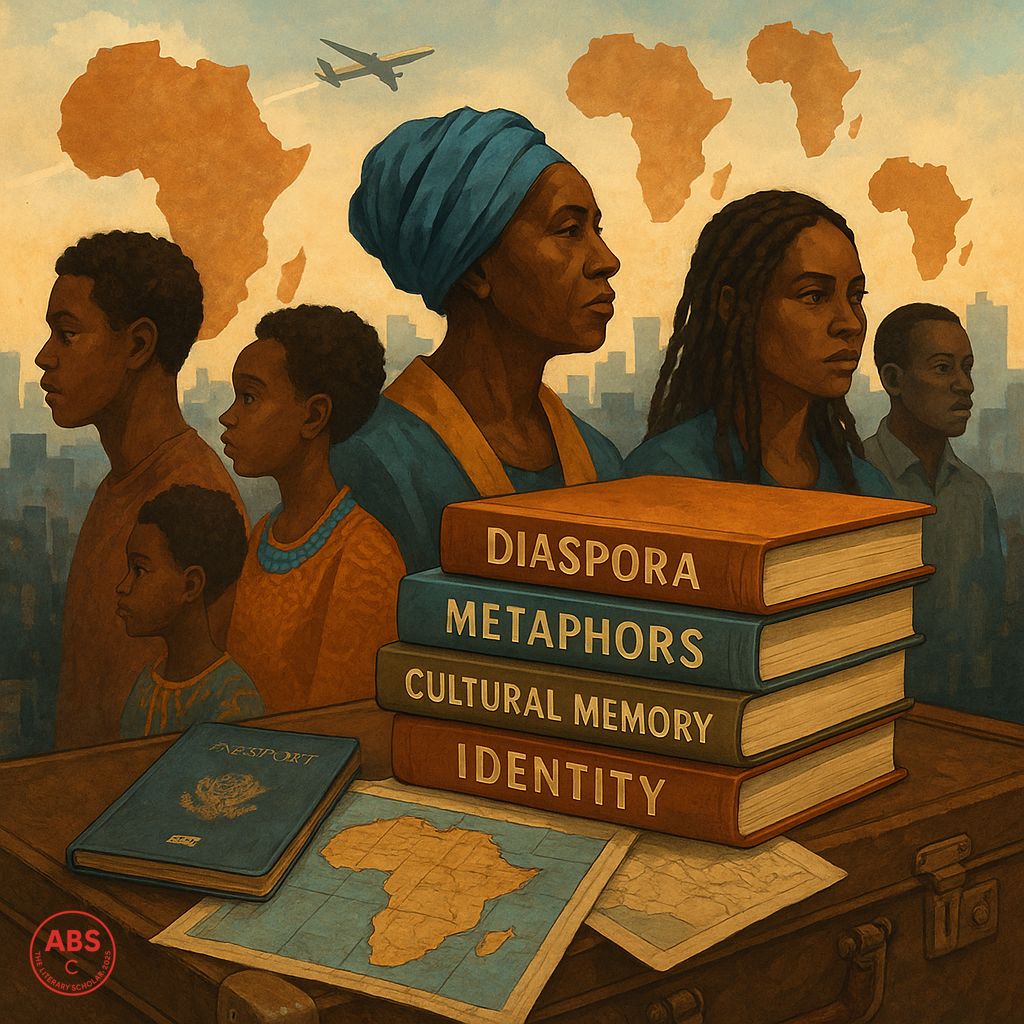Migration, Memory, and the Global Gaze on African Pain—Exported, Exoticized, and Finally Explained
From ABS, Who Believes that exile can write better novels than comfort ever will.
Some left by choice.
Some were pushed.
Some boarded planes, only to find that customs didn’t check for grief, and memory couldn’t be declared.
This is the African literary diaspora: a literature that crosses oceans with a carry-on full of questions, customs, and ancestral sarcasm. Writers who physically migrated but remained mentally, emotionally, and sometimes grammatically tethered to home.
In this space, geography is optional. But belonging is always under revision.
The Pain Economy: How Africa Got Branded in Publishing
Before we meet the writers, let’s address the elephant in the international book fair:
Western publishers love African stories—as long as they bleed properly.
Famine? Yes.
Genocide? Sold.
Dictators? Preferably in uniform.
A child with one shoe and a Nobel-worthy smile? Bestseller.
But African writers in the diaspora have played a clever game.
They’ve written the pain—but with agency.
They’ve told the tragedy—but with teeth.
And they’ve smuggled satire, rage, identity, and joy between the pages—just beneath the blurbs about “heartbreaking beauty.”
Teju Cole: The Flâneur with a Nigerian Passport
Teju Cole, part-time photographer, full-time existential navigator, brought us Open City—a novel where nothing happens, but everything hurts.
Set in New York, the novel explores immigration, memory, post-9/11 paranoia, and displacement with such subtlety that you almost miss the fact that it’s also a quiet reckoning with identity, colonial ghosts, and unprocessed trauma.
Cole doesn’t yell. He whispers. And somehow, that feels louder.
Dinaw Mengestu: Passport in Hand, Country in Question
Ethiopian-born, U.S.-raised Dinaw Mengestu has made a career out of gently peeling back the performance of assimilation. His novels (The Beautiful Things That Heaven Bears, How to Read the Air) explore African immigrants trying to make it in America—and failing gloriously.
There are no triumphant endings here. Just long silences, broken furniture, and men who stare at the past like it owes them an apology.
Mengestu’s gift? Making loneliness literary.
NoViolet Bulawayo: Zimbabwe in Exile, Satire in Overdrive
We met her in We Need New Names, where ten-year-old Darling navigates from Zimbabwe to Michigan, discovering that America isn’t quite the dream—it’s just colder.
In Glory, she goes full Orwell, writing a satirical novel featuring talking animals to critique Zimbabwean politics. Think Animal Farm, but with better accents and deeper shade.
Bulawayo’s diaspora is sharp, stylish, and deeply uncomfortable—for all the right reasons.
Chimamanda Ngozi Adichie (Again, Yes)
Because you can’t skip her twice. In Americanah, Adichie captured the tangled mess of diaspora life—the hair salons, the code-switching, the racism, the romantic nostalgia for home, and the disillusionment with everywhere else.
Her characters don’t just leave Nigeria—they carry it like a second spine. And in doing so, they teach readers that migration isn’t an escape—it’s an echo.
Sisonke Msimang: Essays Across Oceans
South African-born, globally raised, and politically razor-sharp, Sisonke Msimang is a voice that slices through sentimentality. Her memoir Always Another Country is a fierce reflection on exile, identity, activism, and what it means to be “from” too many places.
Her diaspora isn’t just physical—it’s emotional, ideological, generational.
She doesn’t write to return home. She writes to interrogate the idea of home itself.
Warsan Shire: The Diaspora Poet Laureate
“You have to understand,
that no one puts their children in a boat
unless the water is safer than the land.”
These lines by Warsan Shire, Somali-British poet and Beyoncé collaborator, say more in twelve words than entire political campaigns.
Shire writes of war, exile, womanhood, and displacement with the intimacy of a lullaby and the fury of a storm. Her diaspora isn’t abstract—it’s in bodies, borders, and birth certificates.
Identity Is a One-Way Ticket With No Refunds
The diaspora experience isn’t uniform. For some, it’s nostalgia. For others, it’s survival. For many, it’s being a cultural interpreter in a language that doesn’t have the right verbs.
These writers balance:
The weight of ancestral expectations.
The confusion of cultural double vision.
The temptation to perform one’s ethnicity for literary applause.
And the refusal to explain their metaphors for a Western syllabus.
Their literature doesn’t ask for sympathy. It demands complexity.
Home Isn’t a Place—It’s a Palimpsest
Diaspora writing, at its core, is about memory management. What to keep. What to delete. What to translate. What to bury.
Some characters return to Africa. Some never do.
But all of them carry it—folded in pocket-sized guilt and metaphors.
The writing is elegant, yes. But underneath, it’s full of border stamps, ungrieved farewells, and the low hum of airport announcements in broken languages.
ABS waits at a departure gate that leads everywhere and nowhere.
The books hum with airport static, longing, and the click of cultural x-rays.
No luggage. Just stories—crushed, carried, and claimed across continents.
Signed,
ABS
The Literary Scholar who believes that exile sharpens the pen,
and that sometimes the truest stories are the ones not declared at customs.

Share this post / Spread the witty word / Let the echo wander / Bookmark the brilliance
